
- This event has passed.
The Shevchenko Scientific Society in the Context of Ukrainian Intellectual History: 150th Anniversary Conference
May 19 @ 9:00 am - 7:00 pm
Event Navigation
Attend in New York, live via Zoom webinar, or on YouTube.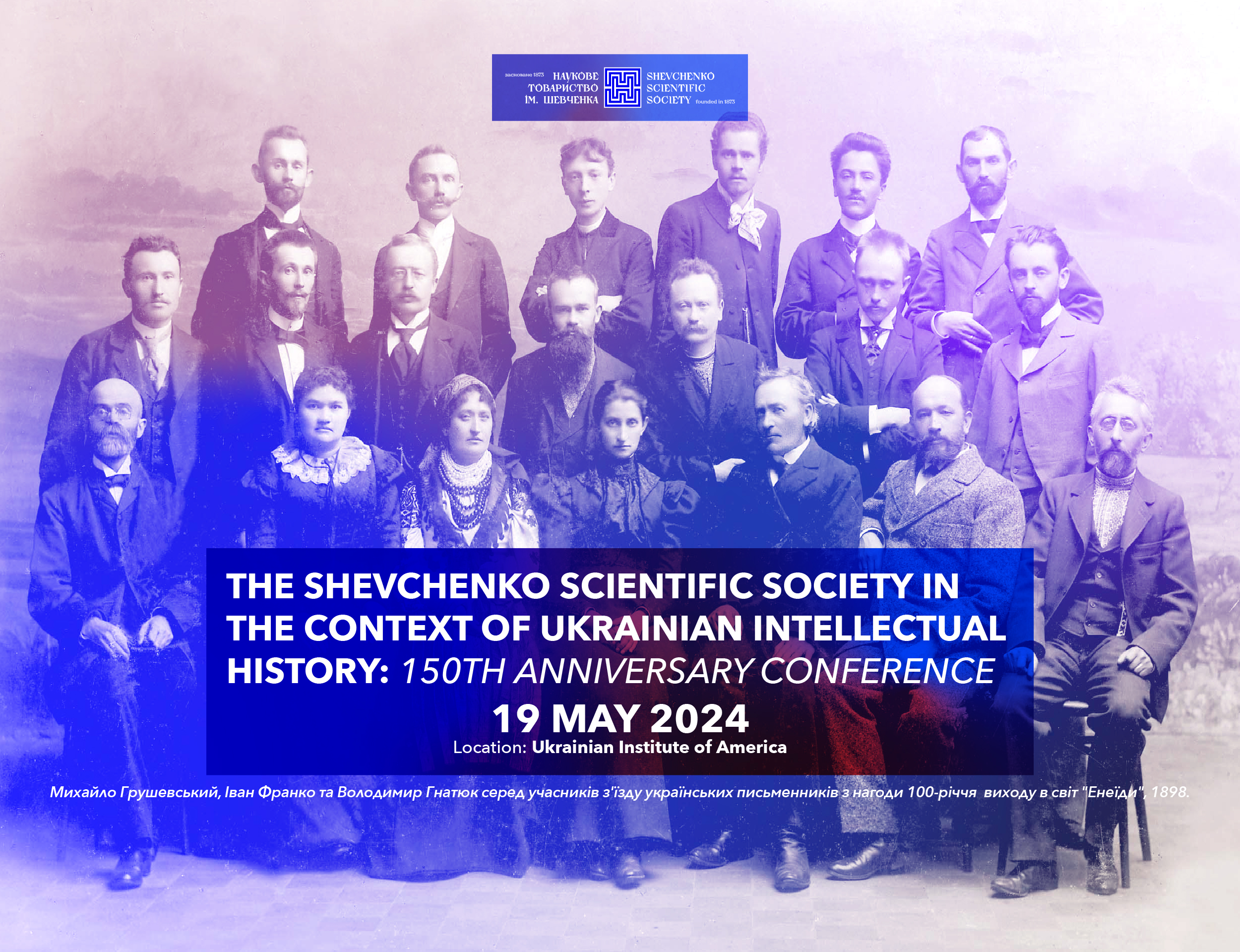
SUNDAY, MAY 19, 2024 | 9:00AM – 7:00PM
Ukrainian Institute of America, 2 E 79th St, New York, NY 10075
Marking 150 years of the Shevchenko Scientific Society, this conference features three panels with scholars from the US, Ukraine, Canada, Germany, Czech Republic, Poland, and Austria. Speakers will discuss the history of the Society’s establishment, the contexts of its activity, and its influence on Ukrainian intellectual and cultural life from its founding to the present day.
Attend in person in New York or live via Zoom webinar. Attendance is free, but registration is required.
REGISTER TO ATTEND IN PERSON | REGISTER TO ATTEND ON ZOOM
WATCH ON YOUTUBE
CONFERENCE SCHEDULE
9:00–9:15
Welcome from Vitaly Chernetsky, conference organizer, First Vice President of the Shevchenko Scientific Society
9:15–11:00
Panel I: Nineteenth-Century Ukrainian Intellectual Life under Russian Imperial Rule
Chair: Halyna Hryn (Shevchenko Scientific Society/Harvard University)
George Grabowicz (Harvard University): Rethinking the Cyrilo-Methodian Brotherhood: Problems of Historiography and Some New and Old Aporias
Serhiy Bilenky (Canadian Institute of Ukrainian Studies, University of Alberta): Before NTSh-A: Scholarship and Politics in 1870s Kyiv
Fabian Bauman (University of Heidelberg): Academic Ukrainophilism and Ukrainian Politics in the Russian Empire under the Ems Ukaz
Discussant: Susan Smith-Peter (College of Staten Island, City University of New York)
11:00–11:15
Coffee
11:15–1:15
Panel ІІ: The Shevchenko Scientific Society and Its Impact, in Galicia and Beyond
Chair: Oksana Kis (University of Richmond/National Academy of Sciences of Ukraine)
Martin Rohde (University of Vienna): Shevchenko Scientific Society and the Making of Ukrainian “National Science,” 1892–1939
Tomasz Hen-Konarski (Polish Academy of Sciences): The Sorcerer and His Apprentice: Kyrylo Studyns′kyi and Amvrozii Androkhovych as Historians of the Greek Catholic Clerical Education
Jan Surman (Czech Academy of Sciences): (Re)writing Ukrainian Academic Language from Habsburg Galicia to the Soviet Union
Discussant: Frank Sysyn (University of Alberta)
1:15–2:30
Lunch Break
2:30–4:30
Panel III: Ukrainian Scholarship and Its Sociopolitical Contexts, from the Nineteenth Century to the Present
Chair: Olena Nikolayenko (Fordham University)
Anton Kotenko (University of Düsseldorf): “Scientific Society” or an “Institution of the Most Radical Ukrainophile Party”? NTSh in the Materials of the Romanov Imperial Censorship
Maryna Paliienko (Taras Shevchenko National University of Kyiv/New York University): Ukrainian Diaspora Archives During and After World War II as a Target of Nazi and Soviet Security Services
Steven Seegel (University of Texas, Austin): The NTSh and Geography: On Some Challenges and Legacies in the Making of Modern Ukrainian Maps, from the 1860s to Stepan Rudnyts’kyi and The February 24th Archive Project
Discussant: Vitaly Chernetsky (University of Kansas)
4:30–4:45
Coffee
4:45–6:00
Concluding Discussion
6:00–7:00
Closing Reception
REGISTER TO ATTEND IN PERSON | REGISTER TO ATTEND ON ZOOM
WATCH ON YOUTUBE
Conference Speakers:
 Fabian Baumann is a historian of Eastern Europe, with a focus on the history of nationalism and empire in Ukraine, Russia, and East Central Europe. He obtained his doctorate from the University of Basel in 2020 and was a SNSF.Mobility postdoctoral fellow at the University of Chicago and the University of Vienna before joining the University of Heidelberg in 2023. His book Dynasty Divided: A Family History of Russian and Ukrainian Nationalism, which deals with the nationally divided Shul’gin/Shul’hyn family of Kyiv, was published by Cornell University Press in 2023.
Fabian Baumann is a historian of Eastern Europe, with a focus on the history of nationalism and empire in Ukraine, Russia, and East Central Europe. He obtained his doctorate from the University of Basel in 2020 and was a SNSF.Mobility postdoctoral fellow at the University of Chicago and the University of Vienna before joining the University of Heidelberg in 2023. His book Dynasty Divided: A Family History of Russian and Ukrainian Nationalism, which deals with the nationally divided Shul’gin/Shul’hyn family of Kyiv, was published by Cornell University Press in 2023.
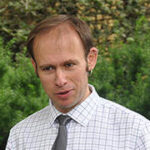 Serhiy Bilenky is a Research Associate at the Canadian Institute of Ukrainian Studies, University of Alberta and, since 2023, Editor-In-Chief of East/West: Journal of Ukrainian Studies. He also has been Program Director of the Harvard Ukrainian Summer Institute (HUSI) since 2015. Born in Kyiv, Ukraine, Bilenky graduated from Kyiv National Shevchenko University, from which he also received his Candidate of Sciences degree in 1997. In 2007, he received his PhD in History from the University of Toronto. Bilenky has taught courses on Russian, Ukrainian, and East European history at the University of Toronto, Columbia University, and Harvard University. His monographs include Romantic Nationalism in Eastern Europe: Russian, Polish, and Ukrainian Political Imaginations (Stanford University Press, 2012) and Imperial Urbanism in the Borderlands: Kyiv, 1800-1905 (University of Toronto Press, 2018). He is the editor of Fashioning Modern Ukraine: Selected Writings of Mykola Kostomarov, Volodymyr Antonovych, and Mykhailo Drahomanov (Canadian Institute of Ukrainian Studies, 2014). Bilenky’s most recent book is Laboratory of Modernity: Ukraine between Empire and Nation, 1772–1914 (McGill-Queen’s University Press and CIUS, 2023), a multidisciplinary history of Ukraine during the “long” 19th century.
Serhiy Bilenky is a Research Associate at the Canadian Institute of Ukrainian Studies, University of Alberta and, since 2023, Editor-In-Chief of East/West: Journal of Ukrainian Studies. He also has been Program Director of the Harvard Ukrainian Summer Institute (HUSI) since 2015. Born in Kyiv, Ukraine, Bilenky graduated from Kyiv National Shevchenko University, from which he also received his Candidate of Sciences degree in 1997. In 2007, he received his PhD in History from the University of Toronto. Bilenky has taught courses on Russian, Ukrainian, and East European history at the University of Toronto, Columbia University, and Harvard University. His monographs include Romantic Nationalism in Eastern Europe: Russian, Polish, and Ukrainian Political Imaginations (Stanford University Press, 2012) and Imperial Urbanism in the Borderlands: Kyiv, 1800-1905 (University of Toronto Press, 2018). He is the editor of Fashioning Modern Ukraine: Selected Writings of Mykola Kostomarov, Volodymyr Antonovych, and Mykhailo Drahomanov (Canadian Institute of Ukrainian Studies, 2014). Bilenky’s most recent book is Laboratory of Modernity: Ukraine between Empire and Nation, 1772–1914 (McGill-Queen’s University Press and CIUS, 2023), a multidisciplinary history of Ukraine during the “long” 19th century.
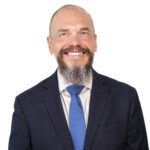 Vitaly Chernetsky is professor of Slavic languages and literatures at the University of Kansas. He is the author of Mapping Postcommunist Cultures: Russia and Ukraine in the Context of Globalization (2007; Ukrainian-language version, 2013), Intersections and Breakthroughs: Ukrainian Literature and Cinema between the Global and the Local (forthcoming, Krytyka), and articles on modern and contemporary Slavic and East European literatures and cultures. He has edited volumes dealing with contemporary Ukrainian poetry and film and an annotated Ukrainian translation of Edward Said’s Culture and Imperialism. His translations into English include Yuri Andrukhovych’s novels Moscoviad and Twelve Circles and a forthcoming edition of Sophia Andrukhovych’s Felix Austria (HURI). Professor Chernetsky is a past president of the American Association for Ukrainian Studies (2009–2018), the current first vice president of the Shevchenko Scientific Society in the U.S., and the current president of the Association for Slavic, East European, and Eurasian Studies (ASEEES).
Vitaly Chernetsky is professor of Slavic languages and literatures at the University of Kansas. He is the author of Mapping Postcommunist Cultures: Russia and Ukraine in the Context of Globalization (2007; Ukrainian-language version, 2013), Intersections and Breakthroughs: Ukrainian Literature and Cinema between the Global and the Local (forthcoming, Krytyka), and articles on modern and contemporary Slavic and East European literatures and cultures. He has edited volumes dealing with contemporary Ukrainian poetry and film and an annotated Ukrainian translation of Edward Said’s Culture and Imperialism. His translations into English include Yuri Andrukhovych’s novels Moscoviad and Twelve Circles and a forthcoming edition of Sophia Andrukhovych’s Felix Austria (HURI). Professor Chernetsky is a past president of the American Association for Ukrainian Studies (2009–2018), the current first vice president of the Shevchenko Scientific Society in the U.S., and the current president of the Association for Slavic, East European, and Eurasian Studies (ASEEES).
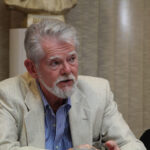 George G. Grabowicz is the Dmytro Čyževs’kyj Research Professor of Ukrainian Literature in the Department of Slavic Languages and Literatures at Harvard University, where he has served as chair of the Department of Slavic Languages and Literatures (1983–1988) and director of the Ukrainian Research Institute (1989–1996). He has been president of the Shevchenko Scientific Society in the U.S. (2012–2018) and is currently a member of the Board of Directors. In 1997 he founded and since then has been editor-in-chief of the Ukrainian monthly Krytyka, a leading intellectual journal in Ukraine. He has written on Ukrainian, Polish, and Russian literature and on literary theory. His first book on Shevchenko (The Poet as Mythmaker) was voted the most influential academic book of the post-Soviet period in Ukraine. In March 2022 he was awarded the Shevchenko Prize, Ukraine’s highest award in the humanities and arts, for his series of articles on modernism and the poet Pavlo Tychyna.
George G. Grabowicz is the Dmytro Čyževs’kyj Research Professor of Ukrainian Literature in the Department of Slavic Languages and Literatures at Harvard University, where he has served as chair of the Department of Slavic Languages and Literatures (1983–1988) and director of the Ukrainian Research Institute (1989–1996). He has been president of the Shevchenko Scientific Society in the U.S. (2012–2018) and is currently a member of the Board of Directors. In 1997 he founded and since then has been editor-in-chief of the Ukrainian monthly Krytyka, a leading intellectual journal in Ukraine. He has written on Ukrainian, Polish, and Russian literature and on literary theory. His first book on Shevchenko (The Poet as Mythmaker) was voted the most influential academic book of the post-Soviet period in Ukraine. In March 2022 he was awarded the Shevchenko Prize, Ukraine’s highest award in the humanities and arts, for his series of articles on modernism and the poet Pavlo Tychyna.
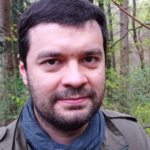 Tomasz Hen-Konarski is a full-time researcher at the Tadeusz Manteuffel Institute of History, Polish Academy of Sciences in Warsaw (IH PAN). He holds a Magister degree from the University of Warsaw, where his teachers included Anna Grześkowiak-Krwawicz, Dariusz Kołodziejczyk, and Zofia Zielińska. He has a PhD from the European University Institute in Florence (2017), where he worked under the supervision of Lucy Riall and Pieter Judson. Apart from Florence and Warsaw, Tomasz either studied, carried out his research, or taught in Bielefeld, Budapest, London, Lviv, and Vienna. Most recently (in 2023), he was a Fulbright-funded visiting scholar at the Harvard Ukrainian Research Institute in Cambridge, Massachusetts. His research interests include: Polish and Ukrainian nation-building in Galicia, Catholic Enlightenment, and the Greek Catholic Church as a political institution of the Austrian Monarchy.
Tomasz Hen-Konarski is a full-time researcher at the Tadeusz Manteuffel Institute of History, Polish Academy of Sciences in Warsaw (IH PAN). He holds a Magister degree from the University of Warsaw, where his teachers included Anna Grześkowiak-Krwawicz, Dariusz Kołodziejczyk, and Zofia Zielińska. He has a PhD from the European University Institute in Florence (2017), where he worked under the supervision of Lucy Riall and Pieter Judson. Apart from Florence and Warsaw, Tomasz either studied, carried out his research, or taught in Bielefeld, Budapest, London, Lviv, and Vienna. Most recently (in 2023), he was a Fulbright-funded visiting scholar at the Harvard Ukrainian Research Institute in Cambridge, Massachusetts. His research interests include: Polish and Ukrainian nation-building in Galicia, Catholic Enlightenment, and the Greek Catholic Church as a political institution of the Austrian Monarchy.
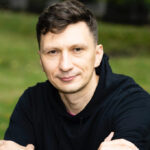 Anton Kotenko is a research fellow at the Chair of Eastern European History of the University of Düsseldorf. His recent publications include “Ukrainians as ‘Aliens’ (Inorodtsy): Governmental Regulation of Ukrainian Cultural Associations, 1905–17,” published in March in Russian Review, and “For Fame and Fortune: The Origins of St Petersburg’s Zoo,” forthcoming in Urban History. Currently he is finalizing a book manuscript entitled “In Search of Ukraine: A Conceptual History of Nationalism, 1840s–1921” and is starting a new project, “Zootopia: History of Zoological Gardens in the Romanov Empire.”
Anton Kotenko is a research fellow at the Chair of Eastern European History of the University of Düsseldorf. His recent publications include “Ukrainians as ‘Aliens’ (Inorodtsy): Governmental Regulation of Ukrainian Cultural Associations, 1905–17,” published in March in Russian Review, and “For Fame and Fortune: The Origins of St Petersburg’s Zoo,” forthcoming in Urban History. Currently he is finalizing a book manuscript entitled “In Search of Ukraine: A Conceptual History of Nationalism, 1840s–1921” and is starting a new project, “Zootopia: History of Zoological Gardens in the Romanov Empire.”
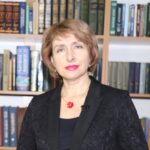 Maryna Paliienko is a Doctor of Historical Sciences and head of the Department of Archival Science and Special Branches of History at Taras Shevchenko National University. She is also editor-in-chief of the journal Archives of Ukraine and is the author of several monographs and numerous scholarly articles on archival theory, history, and practice; the role of the Ukrainian diaspora in the preservation of cultural heritage; and the digital transformation of Ukrainian archives and their visibility in the modern information space. Thanks to a grant from the Fulbright Program, she is currently conducting research in the United States at New York University on the topic “Archives in the Time of War and Emergency: Problems of the Cultural Heritage Preservation and Usage (from the Experience of the USA and Ukraine).”
Maryna Paliienko is a Doctor of Historical Sciences and head of the Department of Archival Science and Special Branches of History at Taras Shevchenko National University. She is also editor-in-chief of the journal Archives of Ukraine and is the author of several monographs and numerous scholarly articles on archival theory, history, and practice; the role of the Ukrainian diaspora in the preservation of cultural heritage; and the digital transformation of Ukrainian archives and their visibility in the modern information space. Thanks to a grant from the Fulbright Program, she is currently conducting research in the United States at New York University on the topic “Archives in the Time of War and Emergency: Problems of the Cultural Heritage Preservation and Usage (from the Experience of the USA and Ukraine).”
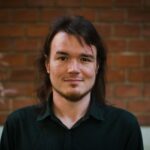 Martin Rohde is a senior post-doc at the University of Vienna, funded by the Austrian Science Fund (FWF) with the project “Transregional Region-Making in the Eastern Carpathians. Ukrainian Knowledge Production and Its Challenges, 1921–1939.” Rohde studied History and Slavic Studies in Salzburg and Göttingen and received a PhD in history from the University of Innsbruck in 2020 with a dissertation called “National Science Between Two Empires. Shevchenko Scientific Society, 1892-1918.” Former workplaces include universities of Innsbruck and Halle/Wittenberg, the Historical Institute of the Czech Academy of Sciences, and the Institute for East and Southeast European Studies in Regensburg. His research interests include history of science and knowledge; history of photography; approaches to postcolonial, imperial, and spatial history with a focus on Ukraine; the Habsburg and Russian Empires; Poland; and Czechoslovakia.
Martin Rohde is a senior post-doc at the University of Vienna, funded by the Austrian Science Fund (FWF) with the project “Transregional Region-Making in the Eastern Carpathians. Ukrainian Knowledge Production and Its Challenges, 1921–1939.” Rohde studied History and Slavic Studies in Salzburg and Göttingen and received a PhD in history from the University of Innsbruck in 2020 with a dissertation called “National Science Between Two Empires. Shevchenko Scientific Society, 1892-1918.” Former workplaces include universities of Innsbruck and Halle/Wittenberg, the Historical Institute of the Czech Academy of Sciences, and the Institute for East and Southeast European Studies in Regensburg. His research interests include history of science and knowledge; history of photography; approaches to postcolonial, imperial, and spatial history with a focus on Ukraine; the Habsburg and Russian Empires; Poland; and Czechoslovakia.
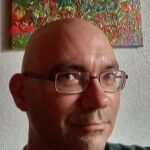 Steven Seegel is Professor of Slavic and Eurasian Studies at The University of Texas at Austin. He is the author of Map Men: Transnational Lives and Deaths of Geographers in the Making of East Central Europe (University of Chicago Press, 2018), Ukraine under Western Eyes (Harvard University Press, 2013), and Mapping Europe’s Borderlands: Russian Cartography in the Age of Empire (University of Chicago Press, 2012). He has contributed to the fourth and fifth volumes of the University of Chicago’s international History of Cartography series, and has translated over 300 entries from Russian and Polish for the U.S. Holocaust Memorial Museum‘s Encyclopedia of Camps and Ghettos, 1933-1945, in multiple volumes, published jointly by USHMM and Indiana University Press. Professor Seegel is a former director of the Harvard Ukrainian Research Institute‘s summer exchange program. He hosts author-feature podcast interviews on the popular New Books Network. He is the founder of The February 24th Archive, an ongoing community-driven, public-facing digital project (follow @steven_seegel on Twitter/X) that focuses on building global solidarities during Russia’s full-scale war against Ukraine.
Steven Seegel is Professor of Slavic and Eurasian Studies at The University of Texas at Austin. He is the author of Map Men: Transnational Lives and Deaths of Geographers in the Making of East Central Europe (University of Chicago Press, 2018), Ukraine under Western Eyes (Harvard University Press, 2013), and Mapping Europe’s Borderlands: Russian Cartography in the Age of Empire (University of Chicago Press, 2012). He has contributed to the fourth and fifth volumes of the University of Chicago’s international History of Cartography series, and has translated over 300 entries from Russian and Polish for the U.S. Holocaust Memorial Museum‘s Encyclopedia of Camps and Ghettos, 1933-1945, in multiple volumes, published jointly by USHMM and Indiana University Press. Professor Seegel is a former director of the Harvard Ukrainian Research Institute‘s summer exchange program. He hosts author-feature podcast interviews on the popular New Books Network. He is the founder of The February 24th Archive, an ongoing community-driven, public-facing digital project (follow @steven_seegel on Twitter/X) that focuses on building global solidarities during Russia’s full-scale war against Ukraine.
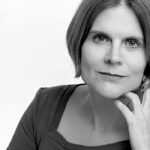 Susan Smith-Peter is Professor of History and Director of the Public History program at the College of Staten Island/City University of New York. She has worked on the history of Russian regionalism for more than 20 years, publishing Imagining Russian Regions in 2018, among other works. Since the full-scale invasion, she has advocated for the decolonization of the field of Russian history in the U.S. Her new research includes work on the influence of Ukrainian thinkers on the Siberian regionalists in the 19th century.
Susan Smith-Peter is Professor of History and Director of the Public History program at the College of Staten Island/City University of New York. She has worked on the history of Russian regionalism for more than 20 years, publishing Imagining Russian Regions in 2018, among other works. Since the full-scale invasion, she has advocated for the decolonization of the field of Russian history in the U.S. Her new research includes work on the influence of Ukrainian thinkers on the Siberian regionalists in the 19th century.
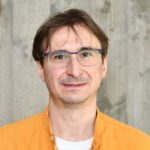 Jan Surman is a historian of Central and Eastern Europe currently based at the Masaryk Institute and Archives of the Czech Academy of Science, Prague. Surman holds a PhD in history from the University of Vienna and has most recently been working at the Herder-Insitute, Marburg; IFK, Vienna; and Higher School of Economics, Moscow. His interests are history of internationalism, language of science, and history of Ukrainian science. His recent publications include Universities in Imperial Austria 1848–1918: A Social History of a Multilingual Space (Purdue University Press 2018); “Science and Terminology in-between Empires: Ukrainian Science in a Search for its Language in the nineteenth century” in History of Science 57:2 (2019), 260-287; and “Imperial Science in Central and Eastern Europe” in Histories 2:3 (2022), 352–361.
Jan Surman is a historian of Central and Eastern Europe currently based at the Masaryk Institute and Archives of the Czech Academy of Science, Prague. Surman holds a PhD in history from the University of Vienna and has most recently been working at the Herder-Insitute, Marburg; IFK, Vienna; and Higher School of Economics, Moscow. His interests are history of internationalism, language of science, and history of Ukrainian science. His recent publications include Universities in Imperial Austria 1848–1918: A Social History of a Multilingual Space (Purdue University Press 2018); “Science and Terminology in-between Empires: Ukrainian Science in a Search for its Language in the nineteenth century” in History of Science 57:2 (2019), 260-287; and “Imperial Science in Central and Eastern Europe” in Histories 2:3 (2022), 352–361.
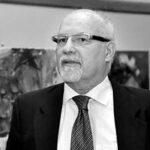 Frank E. Sysyn is director of the Peter Jacyk Centre for Ukrainian Historical Research at the Canadian Institute of Ukrainian Studies (CIUS), professor in the Department of History, Classics and Religious Studies at the University of Alberta, and editor-in-chief of the Hrushevsky Translation Project, the English translation of the multi-volume History of Ukraine-Rus’ (12 volumes). He is head of the executive committee of the Holodomor Research and Education Consortium (HREC) at CIUS, a member of the editorial board of Harvard Ukrainian Studies and East-West: A Journal of Ukrainian Studies, and head of the advisory board of the Ukrainian Program at the Harriman Institute. He has taught at the University of Alberta, Harvard University, Columbia University, Stanford University, and other institutions.
Frank E. Sysyn is director of the Peter Jacyk Centre for Ukrainian Historical Research at the Canadian Institute of Ukrainian Studies (CIUS), professor in the Department of History, Classics and Religious Studies at the University of Alberta, and editor-in-chief of the Hrushevsky Translation Project, the English translation of the multi-volume History of Ukraine-Rus’ (12 volumes). He is head of the executive committee of the Holodomor Research and Education Consortium (HREC) at CIUS, a member of the editorial board of Harvard Ukrainian Studies and East-West: A Journal of Ukrainian Studies, and head of the advisory board of the Ukrainian Program at the Harriman Institute. He has taught at the University of Alberta, Harvard University, Columbia University, Stanford University, and other institutions.
